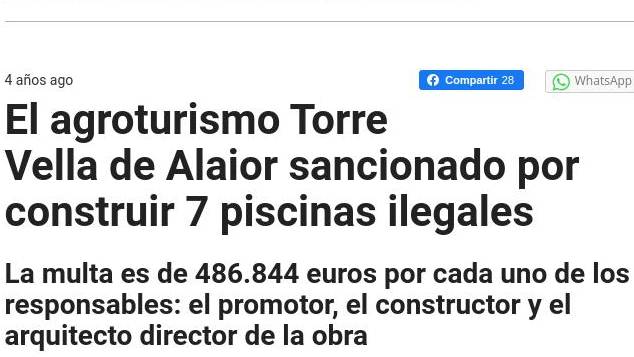Views: 1228
The Alaior Town Council has granted a license to legalize the pools at the Torre Vella agrotourism site, ignoring the warning from the former Environmental Commission, which argued that environmental violations cannot be retroactively legalized.
Decree Law 3/2024, introduced by the Council last May under the guise of “administrative simplification,” actually modifies over 50 regulations. Among the most controversial changes are the lifting of bans on construction in flood-prone areas and the dissolution of the Environmental Commission. We are now starting to see the results of these changes.
Urban and Environmental Violations
In October 2019, GOB reported alleged irregularities at the agrotourism site to the Urban Planning Compliance Consortium. By March 2021, the Consortium had opened a disciplinary procedure, flagging unauthorized construction such as seven pools, platforms, small buildings, pergolas, and concrete pavements on paths and terraces.
The Environmental Commission, which initially approved the project with conditions, ordered an inspection by environmental officers. Besides the issues flagged by the Consortium, inspectors found two waste disposal sites covering over 2,000 m², unauthorized paths, and illegal pavement.
The violations fell into two categories: urban planning and environmental.
The Consortium proposed fines of €486,844 for each of the three main parties involved—the developer, builder, and project architect—covering only the urban violations. No information has been provided on environmental fines.
Conflicts Between the Council and the Environmental Commission
The urban and environmental sanctions were processed by the Biosphere Plaza. The Consortium, led by the head of Territorial Policy in the Insular Council, handled the urban violations, while the Insular Council itself, which had granted the project “general interest” status, took on the environmental violations.
The illegal pools were supposed to be underground reservoirs to collect rainwater and treated water, designed to reduce agrotourism’s impact on the aquifer. The Environmental Commission maintained that these pools were not legalizable, as they weren’t merely a planning breach but an essential environmental requirement for project approval.
The Elimination of the Environmental Commission
When the developers submitted documents to legalize the pools, GOB requested access to the case file from the Alaior Town Council, which refused, citing that it was still in process. This stance raised concerns about transparency regarding public administration records.
The recent Decree Law, signed by President Prohens and then-Minister Marta Vidal, dissolves the Environmental Commission, leaving key environmental decisions to a single individual’s discretion, rather than technical oversight, effectively prioritizing political judgment over technical advice.
Rewarding Offenders
This Decree Law includes numerous regulatory changes. In light of recent flooding in Valencia, the decision to remove building bans in flood-prone areas has sparked renewed criticism.
It’s also widely known that this law enables the legalization of illegal rural construction.
One early result of dissolving the Environmental Commission is now evident: rewarding offenders who not only failed to build reservoirs to save water but converted them into pools that consume even more.
A project that included an environmental auditor to ensure compliance with approved conditions has become a troubling precedent, rewarding developers who misled everyone.
Will Any Significant Fines Be Imposed?
As of now, it remains unknown what penalties will be imposed for these two violations:
- How much will the responsible parties pay for the initial €486,844 urban infraction fine?
- What penalties will be applied for environmental violations?
- Will there be fines for breaking urban regulations with new farm buildings near the Camí de Cavalls?
What precedent are we setting in a Biosphere Reserve like Menorca?


One thought on “Rewarding Illegal Pools?”
Comments are closed.